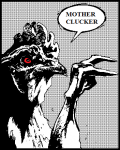Cougar;361076 said:
CI it seems a sound tactic to kill any arguments: expand the definition of 'god' to include everything, making the definition itself absurd.
Kind of reminds me of Marx's base/superstructure argument, you can't argue against it because you are part of it so nuuuhhhh.
I'm interested in the pillars of CIs belief if he'll indulge me with a couple of answers:
You believe that effectively god is everything, the entirety of creation right?
Do you believe that this entirety has any kind of sentient intelligence?
Do you think existence has purpose?
Do you particularly follow one path? So far your statments have encompased a great deal of religious philosophy without seeming to favour one in particular.
I can has cheezburger?
Now you're just indulging me

(Or are you trying to show that I'm a sexed up atheist?)
A while ago DM was kind enough to point me in the direction of
Baruch de Spinoza who, using Descartes' methodology, concluded that god (which was commonly defined by medieval philosophers as an infinite being, having infinite attributes - I can't imagine that anyone would take issue with this definition, it is both in the bible and part of the commonly held perception and tradition) and nature can only be one and the same (as there can only be one substance - see the link for more).
You may say this sounds absurd, but Spinoza's work is highly regarded and considered to be significantly influential. It is interesting that you mention Marx though, as his work seems to have been especially influential to some late 20th century left leaning philosophers.
This concept of god as the infinite is a common belief among modern protestant theologians, due largely to the work of Schleiermacher who, using Kant, attempted to (re?)unite reason with orthodoxy. The idea that religion is symbolic and it's meanings hidden in imagery is not something I've just made up, nor am I the only one who believes that the biblical descriptions of god add up to something other than the common interpretation or popular description. This is not a flight of fancy that I'm taking just because it makes sense to me, although I would still believe it even if it was

Anyway to answer your questions, I would say I believe god can be understood as the reason for all things and in this way the embodiment of all things. It has no sentience in the way that is commonly understood by the word but it is possible to analogously apply sentience to it in order to describe or understand a particular aspect or attribute of god. I believe it can have no purpose; as the infinite it does not do it just is. Finally the path I try to follow is what I feel to be right good or true, and I would say the highest ideal or goal for any life is the freedom to love, which is in itself a long post and this one has taken me long enough. There's only so long you can go on about yourself

If you want to know about my influences, I have few, I'm not widely read and tend to be told about people like Spinoza and Schleiermacher after I've described what I myself already believe. Perhaps you can tell me another one?

 Help
Help
 This topic is locked
This topic is locked



















